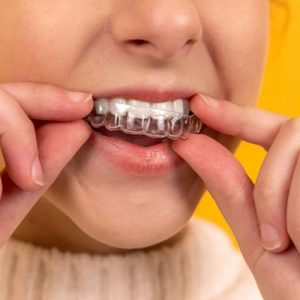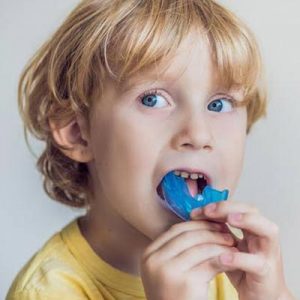If you’ve ever woken up with a sore jaw, headache, or aching teeth, you’re not alone. You could be one of the millions of people suffering from bruxism, better known as “teeth grinding”. The cause is not always clear but it’s considered a common (and subconscious) reaction to stress or anxiety. Even children adopt the habit. Up to 33 per cent of children grind their teeth when their baby teeth or permanent teeth start to emerge. But most kids outgrow bruxism over time, unlike adults.
Teeth clenching is also associated with the condition. Rather than grinding your teeth horizontally or back-and-forth whilst your teeth are clenched, you could just be clamping your jaw together with force whilst you sleep. So if you don’t know you’re doing it, how do you know if you’re a teeth clencher or grinder and what can you do to treat the habit?
Signs of the nightly grind
Ever concentrated so hard or lifted something so heavy, you’ve caught yourself clenching your teeth? It’s easily noticed whilst you’re awake, but clenching or grinding is more common during sleep so the habit may go unnoticed. Signs and symptoms of bruxism include:
- Tender or tight jaw muscles
- Fractured, chipped, loose or aching teeth
- A dull headache, sore jaws, and/or ear pain
- Stiffness in the face and temples, especially after you’ve just woken up
Effects of bruxism
Over time, excessive teeth grinding can cause significant damage to the structure and functionality of your teeth. Dental implants included. The friction caused by grinding wears away the biting surfaces of your teeth. This is called attrition and can lead to the loss of tooth enamel, fractures, and permanent damage to your teeth. The pressure caused by grinding can also lead to dental abfractions – v-shaped notches that appear at your tooth’s gum border. These notches can cause sensitivity to cold, acids, and sweets and can bring about decay if not cleaned properly.
The effects don’t end there. Chronic bruxism can also lead to temporomandibular joint (TMJ) problems. Your TMJ acts like a sliding hinge, which connects your jawbone to your skull. Frequent teeth grinding can cause pain, clicking, or locking of this joint as well as muscular headaches.
Treatment
The good news? Bruxism is treatable. Some remedies may work better than others depending on the underlying cause and severity of your habit. Managing stress, practicing good sleep habits, and limiting your caffeine intake before bed may help reduce the impacts of teeth grinding. But if you’re looking for a more fool-proof treatment, there are other options.
Facial injectables, otherwise known as anti-wrinkle injections, can help ease your aching jaw by relaxing your masseter – the meaty jaw muscle responsible for chewing and biting. Although it isn’t a cure for bruxism, injectables help relax and weaken the muscle which in turn can provide relief from TMJ and grinding related headaches. The benefits typically last anywhere between three to six months depending on the dosage, so follow up treatments with your dentist are recommended for long-term relief.
If the thought of needles has you feeling queasy, ask your dentist about an occlusal splint – a custom plastic moulded mouthguard. Worn during sleep, a splint offers a protective barrier between your upper and lower teeth and can reduce strain on your jaw if you’re an avid clencher. Whilst some pharmacies stock single-use mouthguards, custom fit dental splints are typically more comfortable, durable, easy to clean, and worth the investment for long-term use.
Talk to Whites Dental Care
Since bruxism is hard to identify, contact us as soon as you notice any signs. Your dentist will examine your teeth and ask questions about medications, your daily routine, and your sleep habits to help make a diagnosis.



